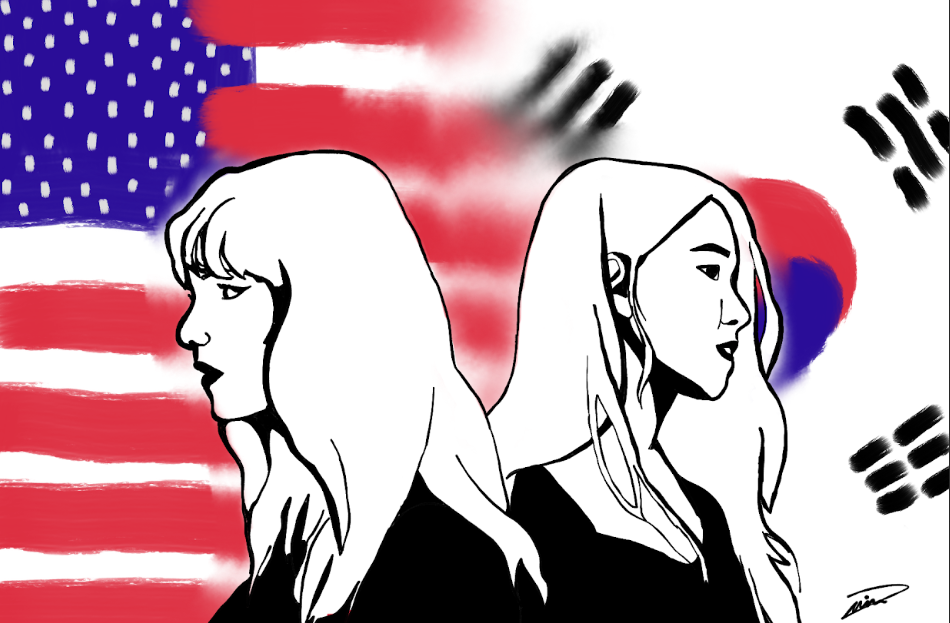I’ve been a fan of K-pop since I was 16, and for a while now, I’ve noticed that some non-fans treat K-pop differently than other genres of music. While there are non-fans who have no opinion on the genre, others aren’t so neutral and actively go out of their way to make fun of it. When I was in high school, I used to get teased for wearing K-pop merchandise. Kids in my classes would purposely mispronounce the Korean names on my sweatshirts to annoy me. Now, on social media (especially X), I’ve seen so many fans of other music genres treating K-pop like it’s weird and cringe.
Recently, I saw a post on X from a Dua Lipa fan complaining that they were being “forced” to listen to K-pop because Dua Lipa was collaborating with BLACKPINK member Jennie on a song for Jennie’s upcoming album, “Ruby.” I couldn’t understand why they would feel that way. Dua Lipa is a pop artist, but so is Jennie. Korean pop music has taken significant influence from Western pop, hip-hop, and R&B — in big part due to the rise of Western songwriters creating and producing music for Korean artists — which has resulted in K-pop’s sounding very similar to Western pop music. More and more K-pop artists are producing English songs with Western-inspired beats and melodies. So, for a casual listener, what is the main difference between K-pop music and Western pop? The language.
I’ve personally never witnessed people treat an international music genre as poorly as they do K-pop. For example, Latin pop is very popular in the U.S., yet I’ve never seen someone treat Latin pop like it’s weird and embarrassing to listen to. I’ve even seen TikToks from ex-fans of K-pop talking about how “glad” they were to “get over their K-pop phase,” like it was an embarrassing time of their life. While having engaged in K-pop stan culture may be a point of embarrassment for some — especially given how the popularity of idols and groups are built on cultivating parasocial relationships with their fans — conflating a dislike of the fandom with a dislike of the music doesn’t fairly assess the genre.
Some non-fans of K-pop on X say that they don’t like K-pop because K-pop artists aren’t real artists, with the complaint being that many idols don’t write their own music. However, plenty of Western pop artists haven’t written the music they sing and promote as well. For instance, popular songs like “ … Baby One More Time” by Britney Spears and “Material Girl” by Madonna were not written by the singers. Pop music is full of background songwriters and producers, and has been for decades.
Additionally, a lot of popular K-pop artists have become increasingly involved in the creation of their own music. Tomorrow X Together (TXT), BTS, and G(I)-DLE are some examples of artists involved in the songwriting and production process for a lot of their songs. As a result, it feels like K-pop is being held to a standard that isn’t equivalent to the Western pop scene.
With K-pop becoming increasingly popular all over the world and the genre still not being taken seriously, it can be easy to blame an undercurrent of xenophobia and a hatred of K-pop fan culture for why people actively hate the music. Some of this has a warranted basis for concern — for example, K-pop fan culture in Korea can be pretty toxic because it relies heavily on parasocial relationships with idols. Korean fans are made to believe that they stand a chance with their favorite idol, to the point where a lot of idols get backlash if they date. Some complaints are outright xenophobic and racist — snarky comments that all idols look the same and that Korean music is inherently inferior to English music are completely uncalled for.
However, it’s equally likely that a lot of this boils down to petty drama. K-pop fans are often incredibly loyal to their favorite artist, to the point where they dedicate a significant amount of time and energy to ensure their favorite group wins an award or ends up charting. This can lead to, K-pop artists taking over Western charts like Spotify, iTunes, and Billboard. BTS topped the Billboard Hot 100 with three separate releases in 2020 for a total of five weeks at #1, putting them in the same range of chart-topping as Megan Thee Stallion and above artists like Ariana Grande and Taylor Swift based on sticking power alone. For those who hate K-pop, this might be really annoying.
I understand that K-pop fan culture can be toxic, and in no way do I support the toxic aspects of it, but it’s unfair to judge the K-pop genre based on fan culture. And it’s also unfair to judge a genre of music because it’s from a different culture. At the end of the day, K-pop is just pop music sung in Korean, and now even English too. It’s one thing to not listen to a genre of music and a whole other thing to go out of your way to talk badly about it. I really hope that one day, all music genres will be given the same treatment and be viewed for what they are — forms of art and expression.

